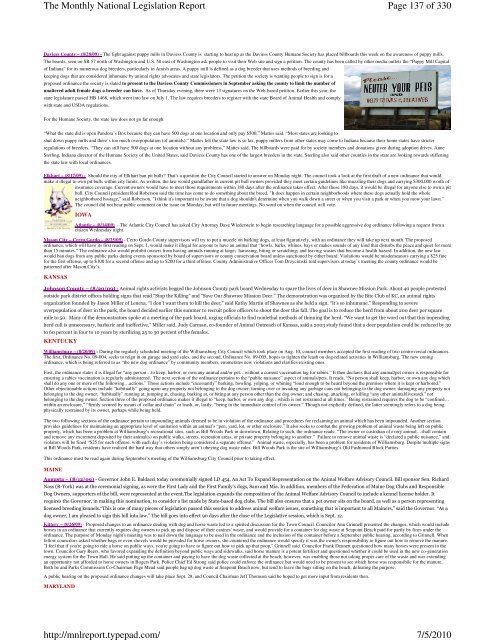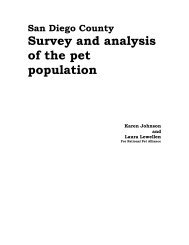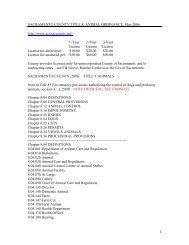Page 1 of 330 The Monthly National Legislation Report 7/5/2010 ...
Page 1 of 330 The Monthly National Legislation Report 7/5/2010 ...
Page 1 of 330 The Monthly National Legislation Report 7/5/2010 ...
You also want an ePaper? Increase the reach of your titles
YUMPU automatically turns print PDFs into web optimized ePapers that Google loves.
<strong>The</strong> <strong>Monthly</strong> <strong>National</strong> <strong>Legislation</strong> <strong>Report</strong>http://mnlreport.typepad.com/<strong>Page</strong> 137 <strong>of</strong> <strong>330</strong>7/5/<strong>2010</strong>Daviess County – (8/28/09) - <strong>The</strong> fight against puppy mills in Daviess County is starting to heat up as the Daviess County Humane Society has placed billboards this week on the awareness <strong>of</strong> puppy mills.<strong>The</strong> boards, seen on SR 57 north <strong>of</strong> Washington and U.S. 50 east <strong>of</strong> Washington ask people to visit their Web site and sign a petition. <strong>The</strong> county has been called by other media outlets the “Puppy Mill Capital<strong>of</strong> Indiana” for its numerous dog breeders, particularly in Amish areas. A puppy mill is defined as a dog breeder that uses methods <strong>of</strong> breeding andkeeping dogs that are considered inhumane by animal rights advocates and state legislators. <strong>The</strong> petition the society is wanting people to sign is for aproposed ordinance the society is slated to present to the Daviess County Commissioners in September asking the county to limit the number <strong>of</strong>unaltered adult female dogs a breeder can have. As <strong>of</strong> Thursday evening, there were 13 signatures on the Web-based petition. Earlier this year, thestate legislature passed HB 1468, which went into law on July 1. <strong>The</strong> law requires breeders to register with the state Board <strong>of</strong> Animal Health and complywith state and USDA regulations.For the Humane Society, the state law does not go far enough.“What the state did is open Pandora’s Box because they can have 500 dogs at one location and only pay $500,” Mattes said. “Most states are looking toshut down puppy mills and there’s too much overpopulation (<strong>of</strong> animals).” Mattes felt the state law is so lax, puppy millers from other states may come to Indiana because their home states have stricterregulations <strong>of</strong> breeders. “<strong>The</strong>y can still have 500 dogs at one location without any problems,” Mattes said. <strong>The</strong> billboards were paid for by society members and donations given during adoption drives. AnneSterling, Indiana director <strong>of</strong> the Humane Society <strong>of</strong> the United States, said Daviess County has one <strong>of</strong> the largest breeders in the state. Sterling also said other counties in the state are looking towards stiffeningthe state law with local ordinances.Elkhart – (8/17/09) - Should the city <strong>of</strong> Elkhart ban pit bulls? That's a question the City Council started to answer on Monday night. <strong>The</strong> council took a look at the first draft <strong>of</strong> a new ordinance that wouldmake it illegal to own pit bulls within city limits. As written, the law would grandfather in current pit bull owners provided they meet certain guidelines like muzzling their dogs and carrying $300,000 worth <strong>of</strong>insurance coverage. Current owners would have to meet those requirements within 180 days after the ordinance takes effect. After those 180 days, it would be illegal for anyone else to own a pitbull. City Council president Rod Roberson said the time has come to do something about the breed. "It does happen in certain neighborhoods where these dogs actually hold the wholeneighborhood hostage," said Roberson. "I think it's important to be aware that a dog shouldn't determine when you walk down a street or when you visit a park or when you mow your lawn."<strong>The</strong> council did not hear public comment on the issue on Monday, but will in future meetings. No word on when the council will vote.IOWAAtlantic – (8/14/09) - <strong>The</strong> Atlantic City Council has asked City Attorney Dave Wiederstein to begin researching language for a possible aggressive dog ordinance following a request from acitizen Wednesday night.Mason City – Cerro Gordo – (8/25/09) - Cerro Gordo County supervisors will try to put a muzzle on barking dogs, at least figuratively, with an ordinance they will take up next month. <strong>The</strong> proposedordinance, which will have its first reading on Sept. 1, would make it illegal for anyone to have an animal that “howls, barks, whines, bays or makes sounds <strong>of</strong> any kind that disturbs the peace and quiet for morethan 15 minutes.” <strong>The</strong> ordinance also would prohibit owners from having animals running at large; harassing, biting or scratching; and leaving wastes that become a health hazard. In addition, the new lawwould ban dogs from any public parks during events sponsored by board <strong>of</strong> supervisors or county conservation board unless sanctioned by either board. Violations would be misdemeanors carrying a $25 finefor the first <strong>of</strong>fense, up to $100 for a second <strong>of</strong>fense and up to $200 for a third <strong>of</strong>fense. County Administrative Officer Tom Drzycimski told supervisors at today’s meeting the county ordinance would bepatterned after Mason City’s.KANSASJohnson County – (8/20/09) - Animal rights activists begged the Johnson County park board Wednesday to spare the lives <strong>of</strong> deer in Shawnee Mission Park. About 40 people protestedoutside park district <strong>of</strong>fices holding signs that read “Stop the Killing” and “Save Our Shawnee Mission Deer.” <strong>The</strong> demonstration was organized by the Bite Club <strong>of</strong> KC, an animal rightsorganization founded by Jason Miller <strong>of</strong> Lenexa. “I don’t want them to kill the deer,” said Kathy Martin <strong>of</strong> Shawnee as she held a sign. “It’s so inhumane.” Responding to severeoverpopulation <strong>of</strong> deer in the park, the board decided earlier this summer to recruit police <strong>of</strong>ficers to shoot the deer this fall. <strong>The</strong> goal is to reduce the herd from about 200 deer per squaremile to 50. Many <strong>of</strong> the demonstrators spoke at a meeting <strong>of</strong> the park board, urging <strong>of</strong>ficials to find nonlethal methods <strong>of</strong> thinning the herd. “We want to get the word out that this impendingherd cull is unnecessary, barbaric and ineffective,” Miller said. Judy Carman, co-founder <strong>of</strong> Animal Outreach <strong>of</strong> Kansas, said a 2003 study found that a deer population could be reduced by 30to 60 percent in four to 10 years by sterilizing 25 to 50 percent <strong>of</strong> the females.KENTUCKYWilliamsburg – (8/20/09) - During the regularly scheduled meeting <strong>of</strong> the Williamsburg City Council which took place on Aug. 10, council members accepted the first reading <strong>of</strong> two controversial ordinances.<strong>The</strong> first, Ordinance No. 09-004, seeks to reign in on garage and yard sales, and the second, Ordinance No. 09-005, hopes to tighten the leash on dog-related activities in Williamsburg. <strong>The</strong> new zoningordinance, which is being referred to as “the new dog ordinance” by community members, enumerates new violations and clarifies existing ones.First, the ordinance states it is illegal for “any person…to keep, harbor, or own any animal and/or pet…without a current vaccination tag for rabies.” It then declares that any animal/pet owner is responsible forensuring a rabies vaccination is regularly administered. <strong>The</strong> next section <strong>of</strong> the ordinance pertains to the “public nuisance” aspect <strong>of</strong> animals/pets. It reads, “No person shall keep, harbor, or own any dog whichshall do any one or more <strong>of</strong> the following…actions.” Those actions include “incessantly” barking, howling, yelping, or whining “loud enough to be heard beyond the premises where it is kept or harbored.”Other objectionable actions include “habitually” going upon any property not belonging to the dog owner; turning over or invading any garbage cans not belonging to the dog owner; damaging any property notbelonging to the dog owner; “habitually” running at, jumping at, chasing, barking at, or biting at any person other than the dog owner; and chasing, attacking, or killing “any other animal/livestock” notbelonging to the dog owner. Section three <strong>of</strong> the proposed ordinance makes it illegal to “keep, harbor, or own any dog…which is not restrained at all times.” Being restrained requires the dog to be “confined…within an enclosure,” “firmly secured by means <strong>of</strong> collar and chain” or leash, or, lastly, “being in the immediate control <strong>of</strong> its owner.” Though not explicitly defined, the latter seemingly refers to a dog beingphysically restrained by its owner, perhaps while being held.<strong>The</strong> two following sections <strong>of</strong> the ordinance pertain to impounding animals deemed to be in violation <strong>of</strong> the ordinance and procedures for reclaiming an animal which has been impounded. Another sectionprovides guidelines for maintaining an appropriate level <strong>of</strong> sanitation within an animal’s “pen, yard, lot, or other enclosure.” It also seeks to combat the growing problem <strong>of</strong> animal waste being left on publicproperty, which has been a problem at Williamsburg’s recreational sites, such as Bill Woods Park in downtown. Relating to such, the ordinance reads: “<strong>The</strong> owner or custodian <strong>of</strong> every animal…shall containand remove any excrement deposited by their animal(s) on public walks, streets, recreation areas, or private property belonging to another.” Failure to remove animal waste is “declared a public nuisance,” andviolators will be fined “$25 for each <strong>of</strong>fense, with each day’s violation being considered a separate <strong>of</strong>fense.” Animal waste, especially, has been a problem for residents <strong>of</strong> Williamsburg. Despite multiple signsat Bill Woods Park, residents have realized the hard way that others simply aren’t obeying dog waste rules. Bill Woods Park is the site <strong>of</strong> Williamsburg’s Old Fashioned Block Parties.This ordinance must be read again during September’s meeting <strong>of</strong> the Williamsburg City Council prior to taking effect.MAINEAugusta – (8/12/09) - Governor John E. Baldacci today ceremonially signed LD 454, An Act To Expand Representation on the Animal Welfare Advisory Council. Bill sponsor Sen. RichardNass (R-York) was at the ceremonial signing, as were the First Lady and the First Family’s dogs, Sam and Mia. In addition, members <strong>of</strong> the Federation <strong>of</strong> Maine Dog Clubs and ResponsibleDog Owners, supporters <strong>of</strong> the bill, were represented at the event.<strong>The</strong> legislation expands the composition <strong>of</strong> the Animal Welfare Advisory Council to include a kennel license holder. Itrequires the Governor, in making this nomination, to consider a list made by State-based dog clubs. <strong>The</strong> bill also ensures that a pet owner sits on the board, as well as a person representinglicensed breeding kennels.“This is one <strong>of</strong> many pieces <strong>of</strong> legislation passed this session to address animal welfare issues, something that is important to all Mainers,” said the Governor. “As adog owner, I am pleased to sign this bill into law.” <strong>The</strong> bill goes into effect 90 days after the close <strong>of</strong> the Legislative session, which is Sept. 12.Kittery – (8/26/09) - Proposed changes to an ordinance dealing with dog and horse waste led to a spirited discussion for the Town Council. Councilor Ann Grinnell presented the changes, which would includehorses in an ordinance that currently requires dog owners to pick up and dispose <strong>of</strong> their canines' waste, and would provide for a container for dog waste at Seapoint Beach paid for partly by fines under theordinance. <strong>The</strong> purpose <strong>of</strong> Monday night's meeting was to nail down the language to be used in the ordinance and the inclusion <strong>of</strong> the container before a September public hearing, according to Grinnell. Whenfellow councilors asked whether bags or even shovels would be provided for horse owners, she countered the ordinance would specify it was the owner's responsibility to figure out how to remove the manure."I feel that if you're going to ride a horse on public ways, you're going to have to figure out how to pick up that poop," Grinnell said. Councilor Frank Dennett questioned how many horses were present in thetown. Councilor Gary Beers, who favored expanding the definition beyond public ways and sidewalks, said horse manure is a potent fertilizer and questioned whether it could be used in the new co-generationenergy system for the Town Hall. He said putting up the container and paying to have the dog waste collected at the beach, however, was enabling those not taking proper care <strong>of</strong> the waste and was extendingan opportunity not afforded to horse owners in Rogers Park. Police Chief Ed Strong said police could enforce the ordinance but would need to be present to see which horse was responsibile for the manure.Both he and Parks Commission Co-Chairman <strong>Page</strong> Mead said people bag up dog waste at Seapoint Beach now, but tend to leave the bags sitting on the beach, defeating the purpose.A public hearing on the proposed ordinance changes will take place Sept. 28, and Council Chairman Jeff Thomson said he hoped to get more input from residents then.MARYLAND




